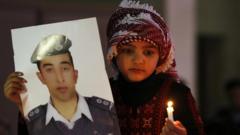The foiled attack on a Taylor Swift concert in Vienna has resulted in charges against a young Syrian national for supporting a foreign terror group. This incident underscores the ongoing threat posed by radical ideologies and raises concerns over security at public events.
Foiled Terror Plot Targets Taylor Swift Concert in Vienna

Foiled Terror Plot Targets Taylor Swift Concert in Vienna
A Syrian youth has been charged with aiding a plot to attack a Taylor Swift concert, leading to the cancellation of multi-city performances in Vienna last year.
A young Syrian national, referred to as Mohamed A, has been charged with supporting a foreign terror group following a thwarted plot to attack a Taylor Swift concert in Vienna last August. German authorities, who describe him as a juvenile and currently not in custody, allege that he has been influenced by the extremist ideology of the Islamic State (IS) and aided another suspect in planning the attack.
The German federal public prosecutor reported that Swift's three sold-out shows at Vienna's Ernst Happel Stadium were canceled on the eve of the first performance, disappointing tens of thousands of fans. The singer later expressed her remorse over the unfortunate events, indicating she felt a "tremendous amount of guilt" about the cancellation.
Investigations revealed that Mohamed A had been in contact with a young adult, known as Beran A, who had ties to an IS cell in eastern Austria. The global terror threat became particularly evident when authorities arrested Beran A, following a tip-off from the CIA, suggesting that the plotters aimed to inflict mass casualties among concert-goers. Beran A, now 20 years old and hailing from Ternitz south of Vienna, was also allegedly involved in planning an earlier attack in Dubai.
According to prosecutors, Mohamed A contributed by translating bomb-making instructions from Arabic and communicating with an IS member abroad. Additionally, he is accused of drafting an oath of allegiance for Beran A to join IS. The plot, reportedly part of a coordinated effort for simultaneous attacks, highlights the persistent risks associated with international terrorism, particularly in settings with large public gatherings.
Both the shocking nature of the incident and its implications for public safety raise significant concerns over future events, including the protection of concert-goers and the larger cultural landscape amidst rising extremist threats.


















